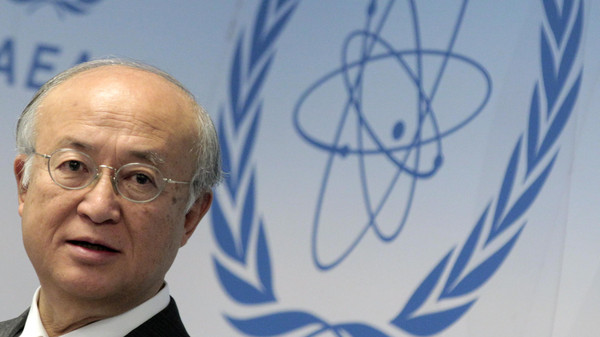ALSO IN MONDAY FORECAST
Foreign Minister Zarif Uses Twitter to Criticize “Spinning” Over Nuclear Talks — But is Kerry His Target?
Author of Controversial Article on Imam Ali Arrested
France FM Fabius: “Not Far from Nuclear Agreement”
US Official in Israel: Iran Balked at Final Language on Interim Nuclear Agreement
MONDAY FEATURES
Special: Success or Failure in the Nuclear Talks? — A 3-Point Analysis
Iran Audio Analysis: 5 Points on Nuclear Talks & What Happens Next
Spotlight: Does Supreme Leader Have a $95 Billion “Financial Empire”?
Iran and the International Atomic Energy Agency have agreed to strengthen “cooperation and dialogue” over inspection, verification and supervision of Tehran’s nuclear programme.
The two sides agreed “as a first step” to six measures within the next three months, including information and access to the Arak heavy-water plant.
Holding up an interim deal on Saturday between Iran and the 5+1 Powers, France had called for a halt to construction of Arak, due on-line in late 2014. Critics have claimed that plutonium, a natural by-product of the heavy-water process, could be used in a militarized nuclear program.
Iran and the IAEA also agreed to arrangements over a uranium mine in southern Iran, information on all new research reactors and 16 sites designated for the construction of nuclear power plants, and clarifications by Tehran of an announcement on additional enrichment facilities and laser enrichment technology.
The head of Iran’s Atomic Energy Organization, Ali Akbar Salehi, said at a joint press conference in Tehran with IAEA head Yukiya Amano in Tehran, “We had successful negotiations regarding further cooperation between Iran and the Agency in various fields. This led to agreeing on a joint statement that sets the roadmap for cooperation.”
Monday’s agreement gives further momentum to a deal between the 5+1 Powers and Iran, who resume negotiations on November 20. The 5+1 are also hoping that Iran will adhere to the Additional Protocols of the Non-Proliferation Treaty.
Bloomberg News has further detail, including a comment by EA: “The real significance of today is that the French objection [at the Geneva talks on Saturday] is not derailing the process. Despite the holdup, we’re on course to getting an agreement.”
Foreign Minister Zarif Uses Twitter to Criticize “Spinning” Over Nuclear Talks — But is Kerry His Target?
Foreign Minister Mohammad Javad Zarif has put out three somewhat-cryptic tweets on Monday night: is he criticizing US Secretary of State John Kerry for blaming Iran for the failure to get a nuclear deal in Geneva on Saturday?
No amount of spinning can change what happened within 5+1 in Geneva from 6PM Thursday to 545 PM Saturday.But it can further erode confidence
— Javad Zarif (@JZarif) November 11, 2013
Mr.Secretary, was it Iran that gutted over half of US draft Thursday night? and publicly commented against it Friday morning?
— Javad Zarif (@JZarif) November 11, 2013
We are committed to constructive engagement. Interaction on equal footing key to achieve shared objectives.
— Javad Zarif (@JZarif) November 11, 2013
Author of Controversial Article on Imam Ali Arrested
Ali Asghar Gharavi, the reporter who wrote an article about Shia’s 1st Imam that led to the banning of a reformist newspaper, has been arrested.
Iran Prosecutor General Gholam Hossein Mohseni Ejei announced the arrest.
In late October, Bahar published Gharavi’s article on Imam Ali, arguing that he was a religious icon rather than a political figure.
Critics said the article undermined the system of clerical supremacy, headed by the Supreme Leader, in the Islamic Republic.
Bahar issued an apology but was banned. Saeed Pourazizi, the head of the newspaper, was arrested on November 2 and later freed on bail.
France FM Fabius: “Not Far from Nuclear Agreement”
French Foreign Minister Laurent Fabius, who blocked an interim deal on Iran’s nuclear program on Saturday, was more conciliatory in remarks today.
“We are not far from an agreement with the Iranians, but we are not there yet,” Fabius told Europe 1 radio. “We are firm, but not rigid. We want peace, and we want to reach the end.”
However, Fabius again raised the two barriers he put up on Saturday, saying Iran must suspend construction of its Arak heavy-water reactor and halt enrichment of uranium to 20%.
He gave no further details, but said:
I am hopeful we will reach a good deal. We want an accord that ensures regional and international stability. If we don’t reach an accord it would be a considerable problem in a few months.”
US Official in Israel: Iran Balked at Final Language on Interim Nuclear Agreement
In what appears to be damage limitation, at least for the US-Israeli alliance, a “senior American official” in Israel has put the blame on Iran, rather than France, for the failure to complete an interim nuclear agreement in Geneva last weekend.
The official, who briefed Israeli reporters and experts in Jerusalem on Sunday, said Iran insisted on formal recognition of its right to enrich uranium.
The American claimed the 5+1 Powers had approved a working document and presented it to the Iranians, according to Herb Keinon of The Jerusalem Post.
“It was too tough for them,” Mr. Keinon quoted the American official, “They have to go back home, talk to their government and come back.”
While Iran is looking for formal recognition of its right to enrich uranium, there has been no indication from Tehran that this had to be in the interim agreement. To the contrary, the Iranians said on Saturday — after the French objections — that they were ready to sign “the deal on the table”.

